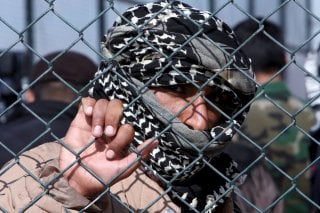America Once Tried to Get Rid of This Refugee Camp. Now Turkey is Bombing It.
Makhmour was a headache during the Iraq War—and is still a symbol of chaotic U.S. policy in the region.
Turkey’s President Recep Tayyip Erdoğan ended the peace process that began in 2013, cracking down on Kurdish activism within the country.
Makhmour residents had told U.S. officials in 2008 that they wanted to go back to Turkey, according to a leaked cable. But Erdoğan’s crackdown changed the situation.
“We came here to live an honorable life, and we paid a very high price,” Cengiz said at her June press conference. “We will not go back.”
Turkey also had a free hand to act against anyone labelled a PKK supporter in Iraq. The ruling Barzani family in Iraqi Kurdistan was opposed to the PKK, and the United States wanted to draw a clear line between U.S.-backed Syrian Kurdish forces and the PKK.
The heat came to Makhmour after PKK operatives allegedly assassinated a Turkish diplomat in Iraqi Kurdistan.
Iraqi Kurdish security forces sealed off the camp, setting up checkpoints and blocking movement in or out.
Authorities claimed that the blockade was “temporary and for protecting the safety of everyone,” and did not apply to “those who have jobs, students, or those seeking [medical] treatment.” Human Rights Watch, however, reported that several people lost their jobs and at least two pregnant women miscarried because they were stopped from leaving the camp.
Cengiz claims that the blockade is still in place.
“People are suffering due to lack of access to the most fundamental, basic conditions of living,” including healthcare, education, and jobs, she said.
Meanwhile, U.S. policy began to shift again after ISIS was defeated.
“The U.S. is wooing Turkey in a way it has not in several years,” Makovsky said, in trying to “drive a wedge between Turkey and Russia.”
Turkey has fought against Russian-backed forces in northwest Syria and Libya, recently forcing Russian-backed Libyan strongman Khalifa Haftar to halt his campaign for Tripoli.
U.S. forces also stepped aside as Turkey attacked the Kurdish-led Syrian Democratic Forces in October, although the State Department maintains that it did all it could to stop a Turkish incursion.
The Trump administration and Congress threatened Turkey with sanctions after the attack, and U.S. intelligence agencies reportedly stopped supporting the Turkish drone war against the PKK.
Nonetheless, Turkey has been emboldened. Turkish aircraft launched an escalating series of airstrikes on Makhmour from late 2018 up until this week.
“In the past, we have lost many people as a result of these bombardments,” Cengiz said. “The authorities are supposed to be protecting us, but because of their silence, Turkey keeps attacking us.”
The Iraqi central government in Baghdad condemned many of Turkey’s incursions, including the most recent one. But it has been unwilling or unable to keep Turkish forces out of its borders.
And the Trump administration has washed its hands of the problem.
“We continue to urge all of Iraq’s neighbors to respect its sovereignty. At the same time, we recognize that Turkey has legitimate security concerns,” a State Department spokesperson told the National Interest. “This is a matter of sovereignty for both countries that needs to be settled on a bilateral basis.”
All the while, the civilians in the camp are caught in the middle. About twelve thousand Kurds from Turkey still live in Makhmour, which is now more of a fortified town than a camp. And refugees from other conflicts have moved into neighboring camps.
“There is one crime that we committed: that we wanted to live like all other nations on Earth and have an honorable life,” Cengiz said. “Yet we are here, trying to live under these pressing conditions.”
Matthew Petti is a national security reporter at the National Interest. Follow him on Twitter: @matthew_petti.
This article originally referred to Alan Makovsky as a liaison to the Turkish military. It has been corrected to reflect his actual position.
Image: Reuters.

